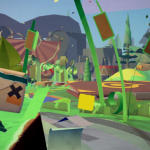Each week in Play in Process, Richard Clark shares what he’s been playing and why it matters.
Recently I’ve been writing and thinking a lot about how games have the unique ability to emphasize where we fall short as human beings. I consider this a major strength – a tendency away from blind and misleading sentimentality is something to appreciate.
Kinect has that ability, too… but maybe not in a good way. I’m still a little bit on the fence on this one, but a lot of what I’m experiencing through the few Kinect games I’ve played is a hightened and skewed since of self-awareness. I explored a little bit of this in an article I wrote over at Kill Screen:
According to Lacan, our true selves are truly realized when we are interacting with others, giving us an opportunity to illuminate one another’s characteristics and personalities. This is the key component missing from Microsoft’s latest Kinect offering. Kinect Fun Labs offers a new technology, but fails utterly at helping us to understand why we would want it in the first place. What’s the point of creating a life-like version of myself, if all I can do is stare at it and scrutinize it? In games, I feel better when I am talking, cooperating, and competing with someone else. This collection of programs is indeed a fascinating look at the future of videogames, but it’s not a flattering one.
Kinect does do a good job, generally of getting you interacting with people in the room – that’s a good thing. Still, it’s somewhat counterbalanced by also asking you to focus, obsessively, on your actual self. You may be portrayed on the screen as a separate avatar, but that avatar is now connected to you in an even more direct way – in many ways, that avatar is you. This is fine, as long as your avatar is doing something along with other avatars – representations of other actual people. Instead, most Kinect games force you to play in a vacuum, with only yourself on the screen. There is a name for this: navel gazing. It’s an unhealthy preoccupation with ones self, and for me at least, it results in a conflicted self-image. The recently released (for free) Kinect Fun Labs is particularly bad because there is no real “play” involved at all. Only posing and gazing.
Kinect’s best experience so far is Child Of Eden, primarily, in my opinion because it takes us completely out of our own field of view. That game is very much about something outside of ourselves – I would like to see more of that.











